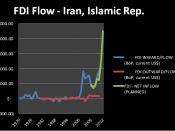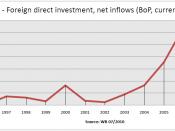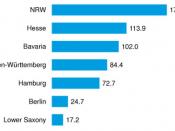The government's failure to advance fiscal and structural reforms left the economy unprepared to withstand a series of external shocks, which triggered the beginning of a prolonged recession from the end of 1998. Social indicators - poverty, unemployment, crime - all remain at dangerous levels, and there is, as yet, little indication that the politicians are getting to grips with the key issues.
Two years ago, a series of misguided decisions by its political leadership plunged Argentina into economic and financial chaos, which has not yet declined. The tension led to such violence that at times there were armed clashes in the streets and police killings. There were moments of such chaos that the entire democratic system seemed in danger of collapse. It brought with it a run on the banks solved by a freeze of deposits, a devaluation that saw the local currency lose two thirds of its value, the default of the government on its bonds, and the resignation of the Nation's President and of his replacement within two weeks of each other.
Protests in December 2001 led to the resignation of President Fernando de la Rua.
Nestor Kirchner was declared the President and assumed office on May 25, 2003. He is determined to clean up politics. He is trying to enhance social spending, encourage increases in private-sector wages and pensions, and foster a recovery of credit through low interest rates. Also, a tough standpoint will be maintained in relation to foreign bondholders and privatized utilities, but the government will also try to attract new investment by gradually re-establishing stable rules and property rights.
The losses suffered by banks, utilities and other foreign companies in Argentina have led many international businesses to re-appraise the potential risks of doing business in the region. Reduced flows of investment and the...



Argentina
Thank you for an interesting discussion of the recent political and economic situation in one of the more important countries in South America. Many of us have read in the newspapers or heard on the news about Argentina's many problems, but you have provided important background information to help us better understand the underlying causes of the unrest. Great work!
6 out of 6 people found this comment useful.